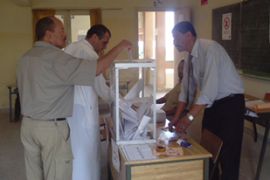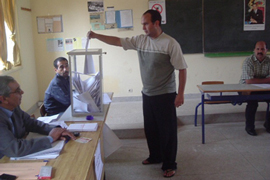Morocco holds parliamentary polls
More than 30 political parties spanning the full ideological spectrum in the fray.

Political statement
Not all who flocked to polling booths voted, however.
Some preferred to make a political statement.
“I came to vote, but I voted for nobody. The reason I came because I wanted to make sure that my vote can’t be used for manipulation or fraud purposes,” Anouar, a 35-year-old manager, said.
|
Elections 2007 | ||
A series of special reports |
“I do not trust political parties, but I have fulfilled my national obligation. Our political parties serve only their interests. We believe only in his Majesty, the king, because he is the only one who serves the people,” he said.
Another voter, Youssef, a 22-year-old student, said: “I voted for a candidate from a minor party. The candidate I voted for is an honest man whom I know very well, but I do not care much about his party”.
The number of voters in the North African kingdom declined from 67 per cent in the 1984 elections to 51 per cent in 2002.
Medium turnout
An electoral officer in charge of seven polling stations in a Rabat neighbourhood, speaking on condition of anonymity, told Al Jazeera that turnout in seven polling stations under his jurisdiction was medium, despite the fact that it was Friday – a day for prayers and rest for most Moroccans.
|
“There are no chances of Islamic groups winning as most people in Morocco are enjoying its liberal culture” Nazia, Lahore, Pakistan |
The latest polls predict the JDP will expand its representation in parliament from 42 of the 325 seats to 70 or more.
The party is particularly popular among the poor in many of the country’s marginalised communities.
It says it will tackle corruption.
Due to the large number of political parties contesting the election, it is unlikely that any single party will win a simple majority.
So the country will in all likelihood be governed by a coalition.
Polling is taking place at 7,380 voting offices across the country. The polls will close at 7pm and results are expected on Sunday.
A new government will be formed after several weeks of talks between political parties and palace officials.
Poll boycott
Two parties are boycotting the polls, the Democratic Path (Annahj Addimocrati) and the Amazigh Democratic party (Al-hizb addimocrati al-Amazighi).
The Democratic Path, founded in 1995, has never taken part in an election, arguing that political life has not witnessed changes and that parliament has no real legislative power.
The king still selects the country’s prime minister.
The Amazigh Democratic party says the it boycotted the elections because of “the lack of recognition for Amazigh identity and the Amazigh language in the constitution, as well as the state’s continuing strategic marginalisation of Amazigh concerns”.
Awareness campaigns
Despite widespread awareness campaigns educating citizens on the importance of voting, the authorities anticipate that slightly more than half of the three million new voters have registered to vote.
|
|
| Anouar, who voted in a Rabat polling centre, said he had no faith in political parties |
The government adopted new electronic methods to encourage voter registration and set up a special internet site (www.elections.gov.ma) where citizens could find answers to common questions about the registration and voting process.
The country’s ministry of interior has allowed voters to register by sending their national ID card number and date of birth by SMS to a toll-free phone number.
Some Moroccan newspapers have highlighted cases of fraud such as handing out cash advances to voters in the run-up to the polls – accusing some political parties of intimidation.
Election fund
The Moroccan government has allocated $61m to fund organising the current legislative elections, which are Morocco‘s eighth, and the second since the ascension of King Mohammed VI to the throne in 1999.
The elections are also the first in Morocco since the parliament approved the new political parties’ law in October 2005, which aimed at reforming political life and increasing transparency.
For the first time in modern Moroccan history, an international group of 43 multinational observers have been granted the right to monitor the elections under the supervision of the National Democratic Institute, a US-based organisation.
The Moroccan Consultative Council for Human Rights has also been officially entrusted with supervising and co-ordinating the monitoring effort.

